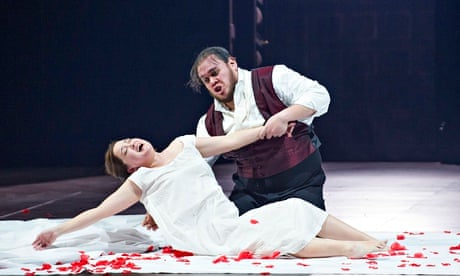"An incendiary work," says Christopher Alden in his director's note for the production of Rigoletto that English National Opera has brought in, originally from Chicago but most recently from Toronto, to replace the Jonathan Miller staging that did such sterling service for the company for more than a quarter of a century. However, on first encounter the show turns out to be less incendiary than one might hope, though whether it's the music or the drama that's dousing the flames is hard to decide.
Alden and designer Michael Levine transplant the opera to the time Verdi composed it, the early 1850s, and to the wood-panelled gaming room of a gentleman's club, replacing the feudal intrigues of Mantua in the 16th century with the equally vicious power games of a moneyed, industrialised society. Rigoletto himself is seen as the "paradigm of a 19th-century male whose power is built on the subjugation of women". That works well enough for the scenes involving the court, though Barry Banks's preening Duke hardly suggests a figure of real power, sexual or otherwise. But it hardly copes convincingly with the rest of the action, so that there's no sense of furtiveness in Rigoletto's hiding of his daughter Gilda, or in his meetings with the assassin Sparafucile, which have to take place in the same wide-open public space.
Within this framework, details are often more distracting than illuminating. Some of the familiar Alden signifiers are there – a fallen chair, a torn portrait, a demented dancer – as well as others that are more specific. The servant Giovanna seems to double as a procurer for all of the gentlemen in the club, while the duke dons a breastplate and brandishes a sword to sing La Donna è mobile. Yet it's hard to work out what any of these mean and what the drama gains from them or from the updating.
Even more crucially, though, the performance rarely sounds convincingly Verdian. From the opening bars of the prelude, the orchestral sound under Graeme Jenkins's routine conducting lacks tension and a sense of inner life; what dramatic intensity there is comes from individuals and especially from Quinn Kelsey in the title role. His Rigoletto is a huge, shambling presence, who sings with tremendous assurance and easy, even richness; that the final scene is less moving than it can be is down to Alden rather than to him. Anna Christy's doll-like Gilda is technically immaculate, but lacking in personality, while Peter Rose's Sparafucile is less dark-toned than some, but still a figure of real amoral power.

Comments (…)
Sign in or create your Guardian account to join the discussion